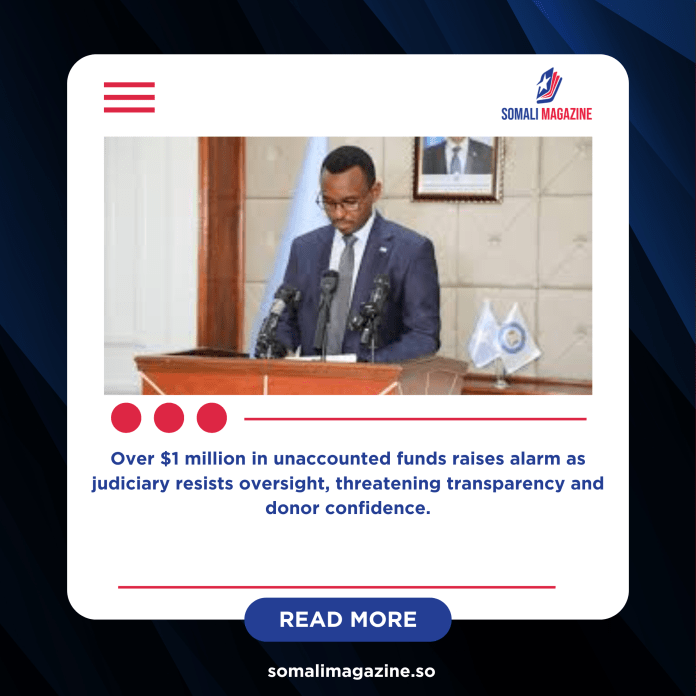Facebook Twitter (X) Instagram Somali Magazine - People's Magazine
Somalia’s Auditor General, Ahmed Issa Gutale, has accused three of the country’s highest courts of blocking mandatory financial audits, raising concerns about transparency and accountability in the justice system.
Gutale told reporters on Tuesday that the Supreme Court, the Benadir Regional Court, and the Benadir Regional Appeals Court all refused to take part in his office’s annual audit process. According to him, this refusal goes against Somalia’s public finance management laws, which require all government institutions to open their books for review.
The Auditor General explained that while 21 other government offices complied with audits this year, the three courts resisted oversight without giving any explanation. Collectively, these courts manage large budgets: the Supreme Court received $2.7 million for 2024, the Benadir Regional Court $2.1 million, and the Benadir Appeals Court $937,000.
Because of their refusal, Gutale’s office carried out a risk assessment on the funds. That investigation uncovered financial irregularities. More than $1 million—specifically $1,089,998.76—collected from fines, auctions, and seized assets was not deposited into Somalia’s unified treasury system as required. Instead, it appeared to have been kept outside government accounts, raising questions about where the money went.
“This practice not only breaks Somalia’s financial laws but also damages the government’s pledge to be accountable with public funds,” Gutale said. He stressed that financial transparency is crucial for building public trust and for ensuring that government institutions serve the people responsibly.
The allegations are particularly sensitive because Somalia is currently trying to strengthen its financial systems after receiving international debt relief. Global lenders and donor countries agreed to reduce Somalia’s debt burden on the condition that the government practices strict fiscal discipline, ensures accountability, and prevents corruption. By refusing audits, the courts risk undermining those commitments and creating doubts among international partners.
Civil society groups and anti-corruption advocates have already raised concerns. They argue that if powerful institutions like the courts can ignore financial rules without consequences, it could weaken reforms that the government has been working hard to put in place. Such actions could also discourage donors who provide critical funding for Somalia’s recovery and development.
Gutale’s announcement highlights a broader struggle Somalia faces in building strong and transparent state institutions. For years, corruption and weak oversight have eroded public confidence in government offices. Efforts at reform, especially in financial management, are seen as essential steps toward stability, economic growth, and long-term governance.
The judiciary, which should ideally stand as an example of fairness and integrity, is now under scrutiny for the way it handles public money. Many observers believe that if the courts continue to block audits, it will set a dangerous precedent for other government agencies that may also attempt to avoid oversight.
Somalia’s government has not yet announced whether it will take action against the courts. The judiciary itself has also not issued any public statement responding to the Auditor General’s accusations. The silence, however, has only fueled more debate among citizens and civil society organizations, who are demanding accountability and answers.
For ordinary Somalis, the issue is not only about numbers and budgets but about trust in their institutions. When funds meant for the public good are mismanaged or hidden, it directly affects services such as infrastructure, health, and education. With the country already struggling to provide for its people, every dollar counts, and the loss of more than $1 million is significant.
The Auditor General has urged all institutions, including the courts, to respect financial laws and cooperate fully with audits. He emphasized that transparency is not optional but a legal and moral duty for every public office in Somalia.
As Somalia continues its journey toward stronger governance and financial stability, the outcome of this dispute between the Auditor General and the courts will be closely watched. Whether the judiciary chooses to cooperate or resist could send an important signal about the country’s commitment to accountability and reform.

